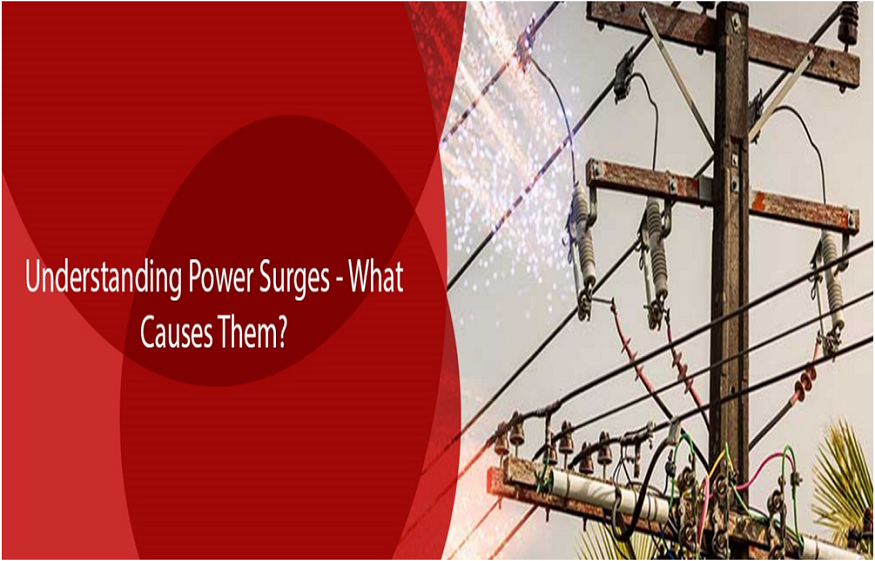
Understanding Power Surges – What Causes Them?
Electrical disasters are one of the leading causes to a home. They can occur spontaneously and can cause a lot of harm to your property, which makes them all the more deadly. A power surge can be caused by a number of different occurrences which you need to be prepared against, otherwise your appliances may get damaged beyond repair.
Your home’s electrical system is important due to how much you rely on it. Without electricity, a lot of gadgets you use in your daily life would be rendered useless. For this reason, the electrical system is both complex and sensitive. There is a lot which can go wrong, and since it supplies electricity directly into your home, you will have to face consequences.
Taking certain precautions to ensure that your home is safe from any potential damages is your responsibility. In order to do this, understanding the root causes of power surges is important. Here are the main sources of power surges and some ways you can protect your home against them.
Lightning Strikes
While this cause may not be common, it is certainly deadly. Lightning strikes occurring near a power source can result in a surge of great magnitude. This kind of power surge is usually unavoidable if appliances are connected and functioning, since the impact is so intense. There’s no way to stop a surge caused by a lightning strike once it’s rushing through the power grid. To deal with lightning strikes, the best way is to take precautions before the storm hits.
Disconnect all major appliances, and if possible, cut off the main power supply completely. This will help ensure that no matter what happens outside, the excess current won’t be able to enter your home.
Outlet Overload
Internal surges are more common than external ones. These surges are caused by issues originating within your home, rather than an outside source influencing your home’s electrical system. When there are too many gadgets in a home, the idea of plugging them all in different places may seem like a hassle. Having wires everywhere can make your home look disorganized and messy, and to combat this issue, homeowners may plug in all their appliances into one outlet for convenience; what people often fail to realize is that this can cause more harm than good.
Every electrical outlet in your home has a certain limit. When you plug too many appliances into it, this limit can be exceeded, which results in a power surge. To avoid this, avoid connecting too many major appliances together, especially when they aren’t in use.
Faulty Wiring
This is another common cause of power surges. Faulty wiring in your home can be due to a few different reasons. Whether an animal chewed into it or the wires are just extremely old, the result can be deadly. Destroyed insulation is a health hazard to begin with, but it can also result in power surges.
Faulty wiring isn’t the easiest to detect, and the best way to find it is by occasional inspection; however, there are certain signs you can note which indicate bad wiring. Flickering lights, buzzing sounds coming from outlets and tripping circuit breakers are some common indicators of faulty wiring. If you notice this, immediately turn off your appliances and contact an electrician.
Power Outage
This one may not seem like a common occurrence, but in areas which experience a lot of storms and power outages, this can be a common cause of surges. Due to the failure of a power grid, the electricity in a large area can go out. While this can sometimes happen without warning, your electrical company may notify you if the cause is manmade. This way, you can prepare for the outage in advance.
The actual power surge does not happen during the outage; it occurs when the power suddenly comes back on. When the power gets back to homes, there is sudden jump in the current which can be too much for some of your gadgets to bear. Appliances should never be connected during a power outage to avoid any potential damages.
What Can You Do?
While there are many sources of power surges, there are also ways to shield your home against them. The following are some general things you can do to make sure your home is no longer vulnerable to a power surge, whether it is predicted or unforeseen.
- Unplug your devices. This is especially important for the larger appliances which would be more difficult to replace.
- Keep an eye on the news. Whether the surge is due to natural or manmade causes, you may be able to learn about it in advances through notifications, either from your electrical company or through weather forecasts.
- Inspect your home for damages, so that any faults in the electrical system can be repaired before they begin to cause harm.
- Get surge protectors. This gadget can help ground the excess current before it enters your home during a surge, which means it will never reach your appliances. A better alternative would be whole-home surge protection, which will automatically secure every outlet in your home.
When it comes to protecting your home, you must consider every potential danger to it. A power surge is one of the most common accidents which can harm your belongings through your electrical system. Being prepared for such an accident can save you time, money and put your mind at ease regarding the status of your home’s safety.


